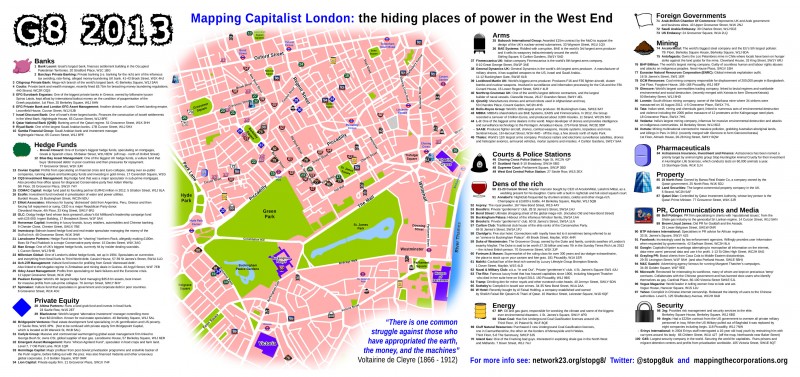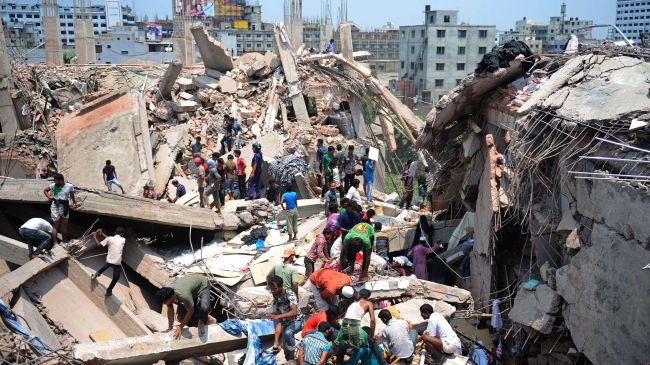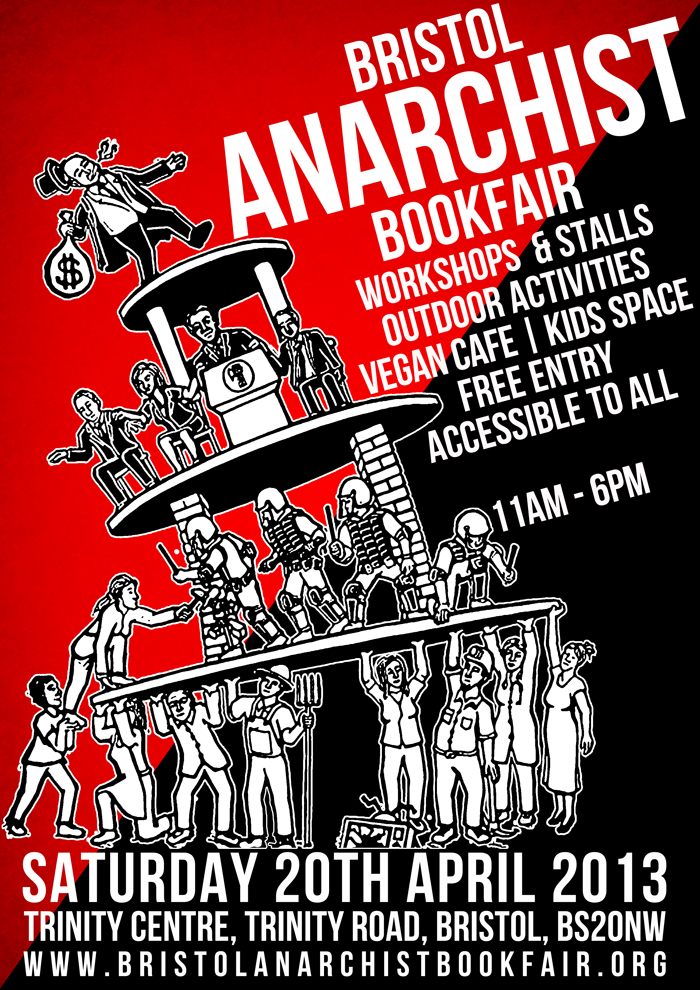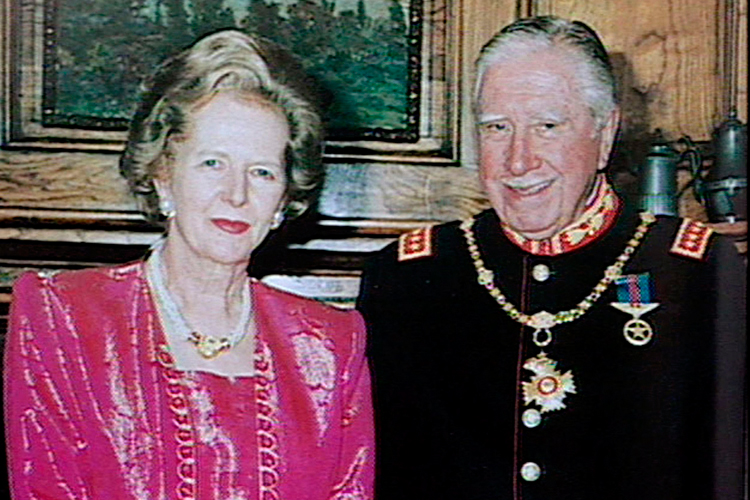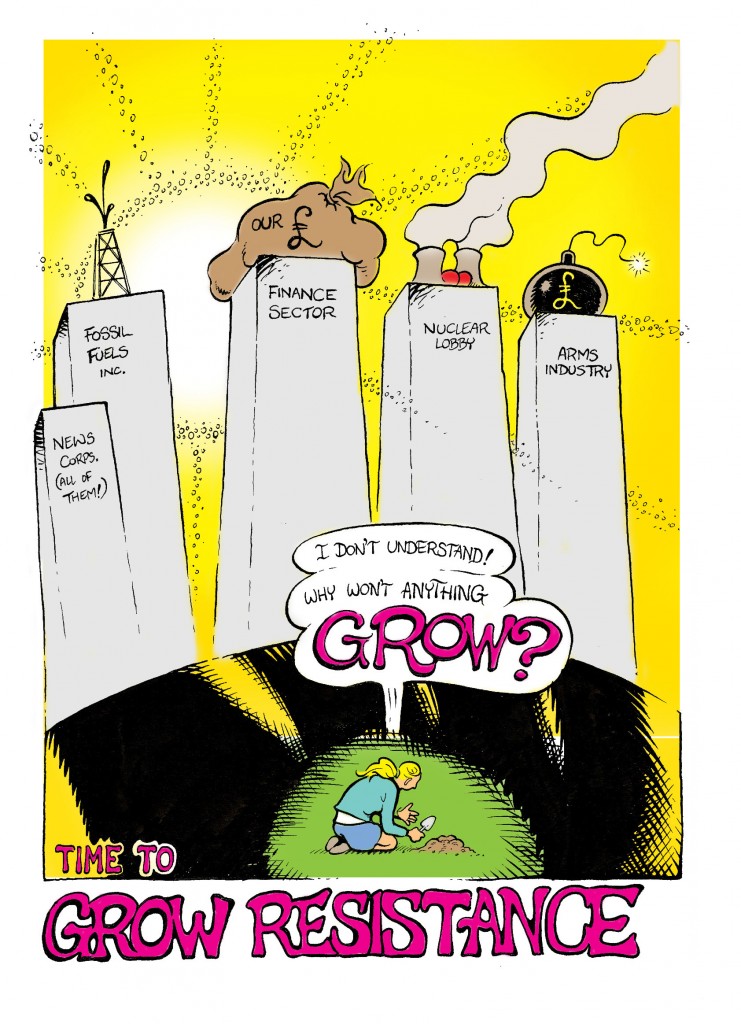Presenting the action map for the June 11 Carnival Against Capitalism. 100 locations in the West End connected to blatant murder, oppression and exploitation. Click on the image above to zoom in, download and print.
There is also an online map which will feature more details and even more addresses. It is still being updated. To check in for latest progress go to: mappingthecorporations.org/ and select “Mapping Capitalist London” in the sector menu.
If you have more information on any company, or want to add a new address, please email stopg8@riseup.net
Read on for background on the map and capitalist London.
This is London.
London is at the heart of global capitalism. It is one of the main hubs of a worldwide system of money and power. Deals made here build factories in Asia, burn down forests in South America, and start wars in Africa. For billionaires, dictators, and other parasites London is a safe place to hide out, launder money, and go shopping. These people are not untouchable. They are right here on our doorstep, and they have names and addresses.
We now live in a globalised economy. Factories in Asia make goods using raw materials from Africa, South America and the Middle East, which are sold (on credit) to European consumers. The UK produces little: a factory here can’t compete with a Bangladeshi sweatshop where wages are pitiful and life is cheap. In the 1980s and 90s the UK economy shifted away from manufacturing to money management, and is now almost entirely based on debt and on London’s role as a financial middleman.
No longer the capital of a powerful country, London thrives as a money-laundering centre for the new global elites. It attracts international wealth with its banking infrastructure, established networks, minimal tax and regulation, historic prestige, and tame population. As the city’s role changes, its landscape is transformed. The valuable real estate in the centre is socially cleansed and secured with private guards, gated areas, and CCTV, pushing us out to the forgotten fringes.
London has three main economic power centres. In two of them, the City and Canary Wharf, the big banks shout their power with glass skyscrapers and neon corporate logos. But much of the power in London is quietly concentrated in the old elite areas of the West End. Here deals are done in whispers, behind unmarked doors.
Money.
Mayfair is home to private banks, banks that cater to the wealthy and don’t ask questions. The map shows just a few of them, including some dedicated to washing money for regimes like Saudi Arabia and Bahrain. The deregulation and financial boom of the 80s and 90s led to new forms of investment including *private equity* and hedge funds. These also gravitated to the private banking zone, making Mayfair the world’s second hedge fund capital after New York.
Private equity investors buy companies and shares in private deals, rather than on ‘public’ stock exchanges. They are less transparent, less regulated, and can make much bigger profits. Some private equity funds take over existing companies, sacking workers and ‘asset stripping’ the firms. Some speculate in real estate, including the ‘land grab’ funds buying up farmland in poor countries, displacing communities and pushing up food prices. ‘Soft commodities’ funds speculate on food and water supplies. Other funds specialise in privatisation, using their political contacts to grab cheap government assets.
Hedge Funds are ‘alternative’ investment managers specialising in risk, secrecy, and big profits. In contrast to the cautious and relatively tightly regulated pension funds of the City they are private partnerships, usually run by a few superstar managers, that publish little information and attract wealthy investors. Hedge funds follow a range of different strategies. Some make their money by gambling on currencies and other financial markets: a number made a killing out of the sub-prime mortgage collapse of 2008. ‘Distressed debt’ funds, sometimes called ‘vulture funds’, are glorified debt collectors who buy up and chase bad debts, including those of struggling countries like Greece and Argentina. Many fund bosses are big political party donors, which helps them fend off regulation and investigation despite their unsavoury reputations.
Dirt, blood and spin.
Some of the world’s bloodiest and most polluting corporations are based in the West End. Oil giant BP and mining companies like Lonmin are vestiges of British colonial power, still plundering Africa and other resource rich regions. Their new neighbours are ’emerging market’ giants like India’s ArcelorMittal, Tata and Vedanta. A number of these companies are based around St James’ Square, south of Piccadilly, the area that is also the traditional clubland of the old British ruling class.
Where there’s a goldmine or an oilfield, you need guns (and drones, jets, guided missiles, etc) and hired killers to defend it. The West End is also the main European base for many of the world’s largest arms companies, including BAE Systems, Thales, Lockheed Martin and more, and also of mercenaries and private security contractors. These can be found clustered around Victoria, and throughout the area.
Some unfortunate regimes and corporations suffer from ‘reputational issues’: i.e. people realise that they are murdering bastards. This is where Public Relations companies like Bell Pottinger, Brown Lloyd James, and M&C Saatchi step in to spin destruction into development. The West End has become a key base of the global PR trade, traditionally centered around Soho.
Dens of the rich.
Once you’ve made obscene money, you need to spend it. London real estate is a prime investment opportunity, and you can get round planning laws by knocking mansions together and digging down for underground swimming pools. The boutiques of Bond Street and the nightclubs of Mayfair and Knightsbridge mix the prestige of the old aristocracy with the glamour of the new mega-rich. Crucially for them all, London is a haven of ‘stability’: extradition treaties don’t touch the elites, and London’s occasional riots usually stay safely away from rich areas.
If we knew our power …
The old idea was that we could overthrow capitalism by uniting as workers and taking over production. But London doesn’t produce anything: the only work left is in the ‘service’ sector, serving the rich. If we want to destroy the system that is killing us, and replace it with sustainable and worthwhile ways of living, we need to identify where our power lies today. Cities like London are key hubs in the circulation of finance and information that keeps the global system going. To function they need stability and security. They rely on us to keep tame and compliant. Time to wake up.

